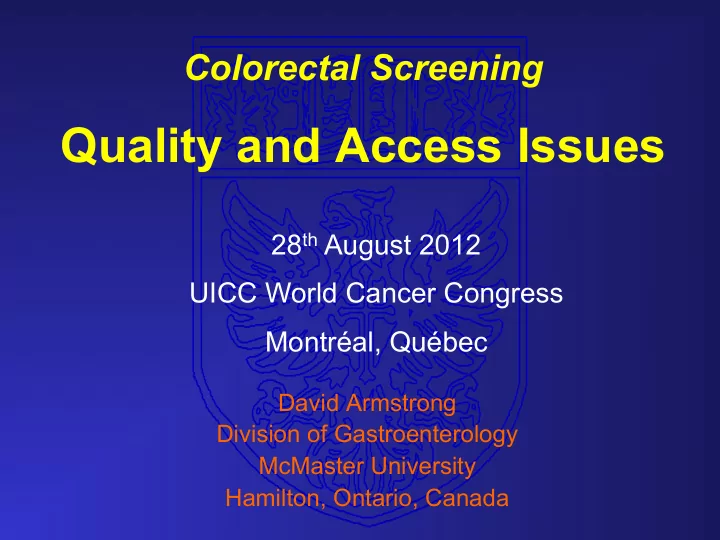

Colorectal Screening Quality and Access Issues 28 th August 2012 UICC World Cancer Congress Montréal, Québec David Armstrong Division of Gastroenterology McMaster University Hamilton, Ontario, Canada
Conflicts of Interest: David Armstrong “Quality and Access Issues” Company Relationship Abbott Laboratories Consulting, Advisory, Speaking, Research Support, Educational Event AstraZeneca Canada Consulting, Advisory, Speaking, Research Support, Educational Event Axcan Pharma Speaking, Educational Event Sponsorship Boston Scientific Educational Event Sponsorship ConMed Canada Educational Event Sponsorship Cook Canada Educational Event Sponsorship Janssen Consulting, Advisory, Research Support, Educational Event Sponsorship Olympus Canada Advisory, Educational Event Sponsorship Pentax Medical Consulting, Advisory, Research Support, Educational Event Sponsorship Shire Canada Advisory, Educational Event Sponsorship Takeda Canada Consulting, Advisory, Speaking, Research Support, Educational Event Warner Chilcott\ Speaking, Research Support, Educational Event Sponsorship XenoPort Inc. Consulting, Advisory, Research Support I shall not be discussing any unapproved or ‘off-label’ use of products
Colonoscopy Quality Overview • Procedure vs Service delivery • Attributes of colonoscopy • Interdependence of quality and access • Access to colonoscopy • Key performance indicators • Practice audit • Framework to optimise colonoscopy
Colonoscopy Quality – The ‘Scope’ C–GRS Management Endoscopy Facility Diagnostic Imaging Information Technology Nursing Pathology Laboratory Colonoscopy Referring MD Endoscopy Equipment Preparation Endoscopy Aide Sedation Anesthesiologist Procedure
Colonoscopy – Attributes • Endoscopic examination of the large bowel & distal small bowel (30 to 60 minutes) • Diagnosis: Visual, Biopsy • Therapy: Resection, Hemostasis, Dilation • Colorectal cancer • Diagnosis: Pre-neoplasia & Advanced neoplasia • Therapy: Polypectomy, EMR, Hemostasis, Stenting • Surveillance & Cancer Prevention (polypectomy) • Diarrhea • Rectal Bleeding • Inflammatory Bowel Disease
Colonoscopy Quality – ‘Issues’ Impaired access impairs quality Access Quality Reduced quality reduces access
Canadian Consensus on Wait Times for Digestive Health Care: Statements A. Patients referred because of a high likelihood of cancer, based on imaging or physical examination, should be seen and, if indicated, endoscoped within two (2) weeks B. Patients referred with bright red rectal bleeding should be seen and, if indicated, endoscoped within two (2) months C. Patients referred for screening colonoscopy should be seen and, if indicated, endoscoped within six (6) months Paterson WG et al. Can J Gastroenterol 2006;20(6):411-423
National Median Wait Times PAGE 4 – 2005 • Wait time: Referral to consultation • 66 days [> 9 weeks] • Wait time: Consultation to procedure • 43 days [> 6 weeks] • Total wait time: Referral to procedure • 91 days [13 weeks] Armstrong D et al. Can J Gastroenterol 2008;22:155
Colonoscopy – Wait Times – 2011 Estimated Numbers Awaiting Colonoscopy 103552& 100'000$ Pa)ent&Numbers& 75'000$ 50'000$ 38209$ 23116$ 25'000$ 18629$ 9905$ 8223$ 5472$ 0$ BC$ AB$ Praire$ ON$ QC$ Atlan;c$ Total$ Barua B et al. Waiting Your Turn. Fraser Institute 2011
GI Endoscopy – 2004-5 & 2008-9 Procedure volumes: Canada 2'000'000$ 2004J2005$ 2008J2009$ + 31.8% 1594896$ 1'500'000$ 1160203$ + 61.8% 969307$ 1'000'000$ 599175$ 492888$ 406792$ 500'000$ 154236$ 132701$ 0$ EGD$ Colonoscopy$ Sigmoidoscopy$ TOTAL$ Canadian Institutes for Health Information (CIHI) National Physician Database http://www.cihi.ca - Armstrong D & Khanna SS. Can J Gastroenterol 2012 (Abstract)
Colonoscopy – Appropriateness EPAGE: European Panel of Appropriateness of Gastrointestinal Endoscopy 100$ EPAGE$I$ 60.5% (375/619) Not appropriate EPAGE$II$ 29.3% (185/619) Not appropriate Colonoscopies&(%)& 75$ 51.5$ 50$ 33.6$ 32.0$ 27.0$ 25$ 19.2$ 17.5$ 11.8$ 7.4$ 0$ Necessary& Appropriate& Uncertain& Inappropriate& Arguello L et al. Gastrointest Endosc 2012;75:138-145
Canadian Association of Gastroenterology Endoscopy Quality Consensus 2012 Armstrong D et al. Can J Gastroenterol 2012;26(1):17-31
Facility Standards and Policies • Endoscopic procedures are performed for an appropriate, clearly documented indication, consistent with current, evidence-based guidelines • Explicit documentation of indication • Evidence: Low / Very Low • Recommendation: Do It – 97% Armstrong D et al. Can J Gastroenterol 2012;26(1):17-31
Training, Education, Competency & Privileges • Endoscopists should regularly review their endoscopic practice and outcome data with the aim of continuous professional development • Endoscopists’ ‘Report Card’ – Practice Audit • Evidence: Low / Very Low • Recommendation: Do It – 94% Armstrong D et al. Can J Gastroenterol 2012;26(1):17-31
Practice Audit Program Principles Point-of-Care Data Input Change in Data Practice Transmission Reflection Website on Practice Database Data Data Review Analysis Website Presentation
QPE: Colonoscopy Practice Audit • Quality & Safety Indicators Recorded ‘Key Performance Indicators’ • Wait times • Indication (Reason) • Time since last colonoscopy • Patient age • Procedure time (start, cecum, end) • Preparation quality (Ottawa) • Biopsy • Polypectomy • Immediate complications Faigel DO, Cotton PB. OMED Endoscopy 2009;41:1069–1074 • Sedation used http://cag.medicalconsensus.org
69 Physicians
CAG Colonoscopy Audit: 2008-2009 Polyp Removal vs. Withdrawal Time Polyp removal rate (%) 100 Polyp&removal&(%&colonoscopies)& 8 minutes 80 60 40 25% removal 20 Spearman&Correla)on&Coefficient&=&0.3949& p&=&0.002& 0 0& 5& 10& 15& 20& 25& 30& Mean&withdrawal&)me:&no&polyp&removal&(min)& Armstrong D et al. Can J Gastroenterol 2011;25:13-20
Canadian Association of Gastroenterology Quality Program Structure Quality Endoscopy Endoscopy Practice Audit Training Endoscopy Credentialing Global Colonoscopy Trainers Reporting Maintain Rating Scale Endoscopy Learners Required Data Current CAG (GRS-C) Residents Practitioners Format Statements
Summary – 1 • Procedure quality should be addressed in the context of system service delivery • Colorectal screening is one of many indications for colonoscopy • Colonoscopy is a diagnostic and therapeutic modality associated with potential for significant adverse events • Quality and access issues for colonoscopy are interdependent
Summary – 2 • Access to colonoscopy is limited despite significant increases in procedural volumes • Reductions in inappropriate procedures may facilitate access to colonoscopy • Consensus on key performance indicators provides a basis for quality assurance • Practice audit allows colonoscopists to monitor and improve practice • Quality & access issues can be addressed within an overall quality framework
Recommend
More recommend